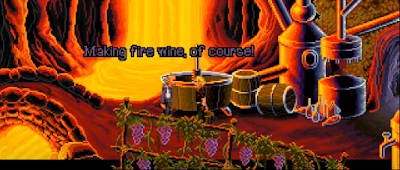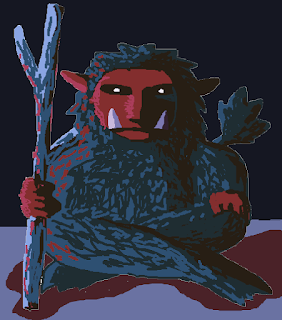This is part of a series about each class belonging exclusivelly to a race or tribe, look them up!
8. BARBARIANS
Rpg orcs have always moved beween a line of "irredemably evil, possibly souless, self spawning cannon fodder" to "just a musunderstood tribe of noble savage". When I went deep analyzing what was the archetypal energy of the orc, I found it was a lot about painting the view that a tribe has of "the others": the tribe A thinks that tribe B has awful, disgusting or heretic customs, and tribe B thinks the same about tribe A; so both are human tribes thinking that their neighbours are the orcs.
Their other defining core trait that both approaches seem to share is rage. Orcs tend to appear as crazy bersekers if, at least, in their tougher members. So, we can say that common orcs are level 0 to 1 barbarians, with Uruk hai / Bugbears being the Level 4+ ones.
The divergences between Trow Fighters and Orc Barbarians imply a radically different approach to life. While Trow build fortresses and have, in general, a thematic of "civilizing" the world around them, Orcs are more similar to earth's raiding tribes (vikings, polynesian raiders, mongols). As this defines them as a race, it makes it clear that they live in a permanent, never ending raid.
Orc tribes have their settlements on a big chain of barren islands at the north; which are relativelly protected from monsters thanks to their geographical situation (maybe there are bigger monsters at the sea that prevent the continent's monsters to reach there). They could probably survive there, but they have an inner rage that drives them inexorably to lust for battle. This is so that the (more sensible) orc women send them out the islands once they reach fighting age; or else they would start wars amongst them. There is a great spring party at that times, where the women that want to have kids search for the best warriors just before their departure. Often they encourage them to gather riches in the mainland for her, an ancestral custom which secretly serves the purpose of making the berserker orcs more stubborn to persist in their raid and possibly never return. The rites end with all the women saying goodbye to their lovers, brothers and sons as the longboats step into the sea, probably to never return, just like the highschool girls did back in the WW2 with the japanese kamikazes.
9. BARDS
Bards, as they are depicted in most rpgs, are almost as cheesy and zany as Dwarves, and I don't understand the appeal of having a guy playing the lute in battle. Still, if we stick to the concept of bard as depicted by this and this, which is basically make them lesser thieves with some charisma (and don't give them spells, at least not at low levels) I can work something from them.
Do you remember the classic trope in videogames of the merchant that sells equipment and appears anywhere on the map, even when the zone around is infested by enemies? Cardinal Quest for example has them. Secret of mana has them being cat people called nekos, and Dragon Warrior has them even as a playable class.
Furries or not, I will center here more in the nature of their tribe and organization. So, Merchants level up like Bards.
At level 1 they can read scrolls, have some lore and maybe some bonus to charisma. It makes sense they have it providing they live on selling stuff. It is also implied that it is the way they solve trouble in their travels, given that they are not a full combatant class. It also suits them when the game rules give luck bonuses to bards, though its not necessary.
At higher levels they do know spells which make them supernatural merchants. Those are the kind that might dare to appear at the mouth of the endgame evil fortress to sell you your missing potions.
Despite being based on the bards, they do not need to carry an instrument with them, or even sing. But of course, some of them might. Some of them might even charge money for songs or dances instead of wares. They might charge you for writing a song about your deeds (fake or real), bringing a message to a far away city or identifying items. Of course, and as with other races, this doesn't mean that other races cannot go trading across the world, but they are just not Merchants from the Merchant culture and they don't advance as bards.
As a culture of their own they are pretty much nomads. But there IS a merchant home, and its very very cool in my mind. Hear this: They call it Mirage City. It can be found when one is lost in the desert, wavering like if it was reflected in the water on a pool. But even if it seems close, non-initiated visitors will never achieve to get in, only walk towards it forever. What is the trick exactly, I leave it to you.
Inside the city all the merchants make deals and re-locate their loots among themselves, preparing for their next routes. Its a city of music and dances, intrigues and heists. Basically your classical arabian, city of brass setting filled with Arabian Nights topics. As it is a good place for a den of thieves, it makes sense that there are Hobbits living amongst them too (both of the honest hard-working class and the thief kind) in their accustomed symbiotic bond of assistants.
10. ALCHEMISTS
As I mentioned in the first post marginally, gnomes are the alchemists of this land. They build underground cities which I picture very colorful and weird, like I remember the Nome Kingdom in the Wizard of Oz anime: Strange glowing things in all colors making a very bright underdark; crazy dreamscapes combined with pools of lava, gemstone ornaments, wonderful treasure and deadly traps. Which is cool because this is a game about dungeons.

















